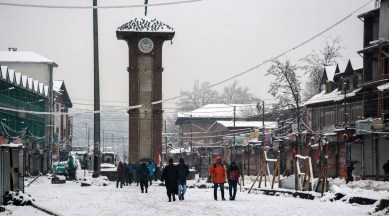Stay updated with the latest - Click here to follow us on Instagram
Supreme Court dismisses plea challenging delimitation in Jammu and Kashmir
The Centre had said the Jammu and Kashmir Re-organisation Act does not preclude the establishment of a Delimitation Commission by the Central Government and provides for two alternative mechanisms to carry out delimitation for the Union Territory.

The Supreme Court Monday dismissed a plea challenging the Centre’s decision to constitute a Delimitation Commission for the Union Territory of Jammu and Kashmir under provisions of the Delimitation Act, 2002, and the exercise of delimitation of assembly constituencies undertaken by the Commission on the basis of the 2011 Census.
While the court found “absolutely no merit in any of the contentions raised by the petitioners”, it referred to the J&K Reorganisation Act and clarified that its “findings…are on the footing that the exercise of power made in the year 2019 under clauses (1) and (3) of Article 370 of the Constitution is valid”.
“We are aware that the issue of the validity of the exercise of the said powers is the subject matter of petitions pending before this Court. Therefore, we have not dealt with the issue of validity. Nothing stated in this judgment shall be construed as giving our imprimatur to the exercise of powers under clauses (1) and (3) of Article 370 of the Constitution,” the bench of Justices S K Kaul and A S Oka said.
The petitioners, Srinagar residents Haji Abdul Gani Khan and Mohammad Ayub Mattoo, had argued that delimitation cannot happen on the basis of the 2011 Census but must be carried out as per the 2001 Census or await “the first census after the year 2026”.
They cited the Delimitation Act, 2002, which says the “Commission shall readjust the division of each State into territorial constituencies for the purpose of elections to the House of the People and to the State Legislative Assembly on the basis of the census figures as ascertained at the census held in the year [2001]”.
Rejecting the contention, the bench noted that “what is important to note is that by virtue of…the J&K Reorganisation Act, the year 2001 stands substituted by the year 2011 in relation to the Legislative Assembly of the Union Territory of J&K”.
The court ruled: “…therefore, the Delimitation Commission established under the Order dated 6th March 2020 had to undertake the exercise of delimitation or readjustment on the basis of the census figures of 2011 as the earlier exercise of delimitation of the constituencies of the erstwhile State was not made on the basis of the census figures of 2011”.
It said: “…for the reasons stated above, there is nothing illegal about the exercise of delimitation/ readjustment of the constituencies undertaken by the Delimitation Commission for the purposes of dividing the Union Territory into 90 constituencies on the basis of the 2011 census figures”.
On the legality of the Centre setting up a Delimitation Commission by notification dated March 6, 2020, the bench said “the J&K Reorganisation Act, which created the two new Union territories, assigns the role of readjustment of constituencies to the Delimitation Commission under the Delimitation Act, 2002”.
“Article 4 of the Constitution permits the Parliament to incorporate such provisions in the law made in accordance with Article 3 for the formation of new States and Union territories, which may be necessary to give effect to the provisions of the law. Such a law may also contain provisions as to representations in Parliament and in the Legislature of the State or States affected by such law.
Therefore, such law which is made under Article 3 can always provide for readjustment of the Constituencies in the newly constituted States or Union territories through the Delimitation Commission. Hence, we hold that there is no illegality associated with the establishment of the Delimitation Commission under the impugned Order dated 6th March 2020,” it said.